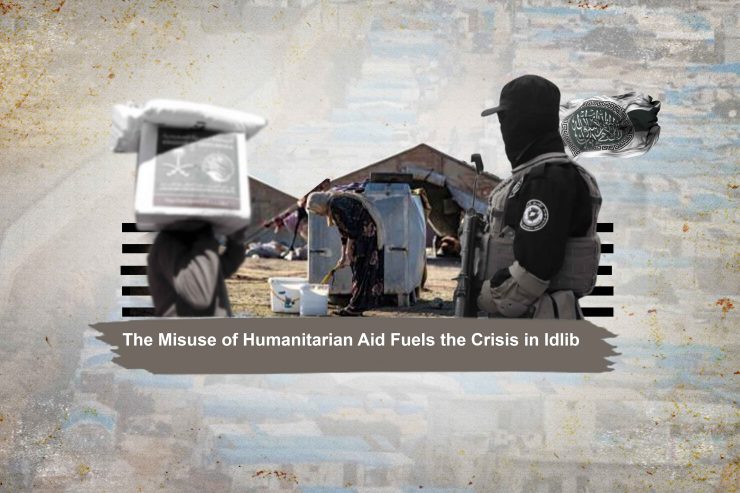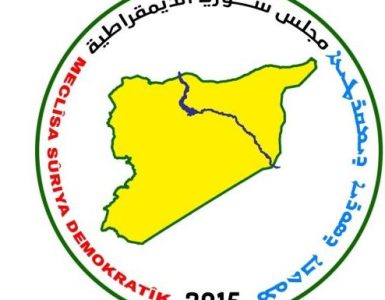By Bilal al-Ahmad
IDLIB, Syria (SDC) – The northwestern region of Syria, including Idlib and areas of western countryside of Aleppo, witnesses a severe humanitarian crisis that is worsening day by day. Over four million Syrians in these devastated areas live in dire conditions, relying heavily on humanitarian aid to survive. However, this aid, which is a lifeline for the population, has been a means exploited by the controlling forces in the region.
Hayat Tahrir al-Sham (HTS), formerly known as al-Nusra Front, the dominant force in Idlib and its surroundings, systematically exploits humanitarian aid. Practices of the HTS include providing large quantities of relief materials to its fighters, selling them in the black market, and imposing fees on humanitarian organizations operating in the area. This dire situation exacerbates the suffering of the local population, who face hunger and disease amid deteriorating and economic conditions and a collapsed infrastructure.
HTS Exploits Humanitarian Aid
Reports confirm that HTS exercises complete control over the distribution of humanitarian aid in areas under its influence. This control is manifested in several ways, including monopolizing the distribution process, directing aid to specific areas, and imposing fees on relief organizations.
Khalid, a worker in a local humanitarian organization. “We face immense difficulties in delivering aid to those in need. The HTS controls everything, starting from the entry of trucks to the distribution of materials to families in need. We are forced to distribute aid according to pre-prepared lists, without being able to verify the actual needs of the beneficiaries”, Khaled said.
Black Market for Humanitarian Aid
Humanitarian aid is being directed to a black market in areas controlled by the HTS. It is supposed that Food and medical supplies be distributed for those in need, but they are sold at high prices in local markets.
Also: Syrians face challenges at the start of the new academic year
Ahmad, a shopkeeper, lives in Idlib. “We witness how aid supplies, marked with the logos of relief organizations, are being sold in markets. It is obvious that some people exploit this crisis by selling aid meant for the vulnerable groups at soaring prices”, Ahmad said.
Economic crisis exacerbates the suffering of IDPs
The economic crisis has severely impacted the IDPs living in the camps in northwestern Syria. These individuals, who fled their homes due to conflict, face a dire situation. This situation is represented with limited aid and a constant struggle to meet their basic needs.
Um Muhammad, a displaced woman, lives in one of the camps in the countryside of Idlib. “We wait long hours to get food rations that are insufficient and often run out. We do not know how we will provide food for our children in upcoming days”, she described the situation.
The soaring prices of basic goods in Syria, coupled with a deteriorating economy in 2023, have made the humanitarian aid to be a lifeline for those struggling to survive.
Abu Mahmoud, a displaced farmer from the countryside of Idlib, highlighted the challenges in northwestern Syria. “Living conditions have become unbearable. Food prices have increased dramatically, and we can barely afford essentials. The aid we used to rely on is now scarce and difficult to access”, he said.
Statistics of Poor Families in NW Syria
The recent statistics reveal the dire situation experienced by the residents in NW Syria amidst the severe humanitarian crisis. According to statistics in July 2024, the poor families are 88.82 percent of total residents. These figures reflect the daily struggles faced by millions, where securing basic necessities like food is a constant challenge.
Border Crossings are Crucial for UN Aid
Border crossings in northern Syria play a pivotal role in the humanitarian crisis. Bab al-Hawa crossing, in particular, has a critical importance as it is the sole crossing for the entry of UN aid into NW Syria.
Also: Authority in Damascus uses intimidation to drive out opponents from Daraa
Since 2014, the continuation of entry of aid through Bab al-Hawa crossing has been discussed at the UN Security Council as a political matter. Russia, an ally of the authorities in Damascus, has succeeded in reducing the number of open crossings from four to one and in changing the renewal period from a year to six months.
Mahmoud, a displaced living in a camp in Idlib, expressed his constant anxiety about the uncertain future of the crossing. “We live in constant fear. The renewal of the continuation of entry of aid through the crossing is a political decision. It could have a devastating impact on our lives”, Mahmoud said.
Calls for Sustainable Solutions
Amidst this escalating crisis, there are calls for urgent international intervention to ensure the delivery of aid to those in need. Humanitarian organizations and local activists emphasize the need for strict international monitoring mechanisms to prevent the misuse of aid.
Samir, a doctor at a field hospital in Idlib, described the situation as a miserable one. “We urgently need an effective international intervention. The lives of millions in danger, and the international community should take measures before a humanitarian catastrophe occurs”, Dr. Samir said.
The humanitarian crisis in NW Syria is multifaceted, compounded by the misuse of aid. It is imperative for the international community to address this crisis. Urgent measures are needed to ensure aid is delivered transparently to those most in need.
Moreover, it is essential to address the main causes of the crisis. This will be achieved through finding a comprehensive political solution to the Syrian conflict, intensifying efforts for reconstruction and improving economy. The fate of millions of Syrians in NW Syria depends on the international community’s response to halt this ongoing humanitarian tragedy.




